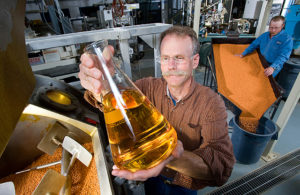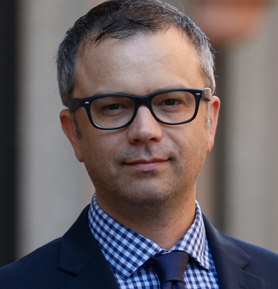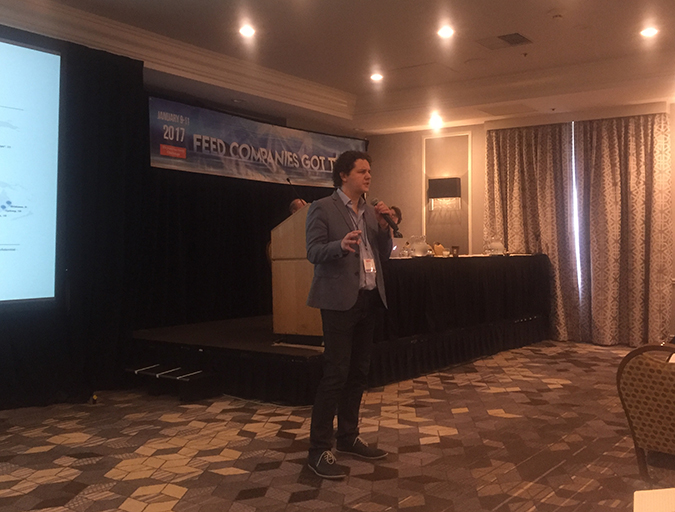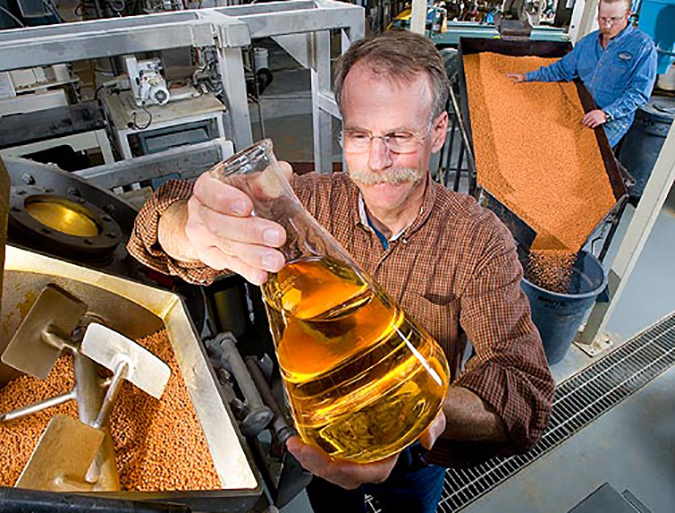Registration for new aquafeed sustainability contest opens Sept. 5

Building off the success and excitement of the fish-free aquaculture feed cash-prize contest that concludes this fall, the F3 Challenge has set its sights on a new target: fish oil alternatives.
Judges for the new competition, which opened registration this week and closes on April 30, 2018, say the degree of difficulty has increased, as producing a fish-free fish oil substitute is technically more difficult and complicated than producing a dry feed ingredient in bulk.
“We believe that through innovation there are companies and individuals who can come up with these products that will fit the need of the industry both nutritionally for the animals and nutritionally for the final consumers,” said Kevin Fitzsimmons, professor at the University of Arizona, which is collaborating with the Anthropocene Institute, the New England Aquarium, World Bank, UMass-Boston and Synbiobeta on the competition.
For a fish-free oil to qualify, it must be from cultured organisms, including but not limited to yeast, algae and fungus in a dry powder or liquid form. It must be free of marine animal ingredients and have an essential fatty acid profile that meets a specific range criteria (see Table 1.) Range values are from the fatty acid profiles seen in Pacific sardine, anchovy, Atlantic herring and menhaden fish oils.
F3 Fish Oil Challenge, Table 1
| Omega-6 20:04 ARA (% of total fat) | Omega-3 20:05 EPA (% of total fat) | Omega-3 22:06 DHA (% of total fat) | Omega-3:Omega-6 ratio | |
|---|---|---|---|---|
| Range | 0.2 – 1.6 | 8.4 – 17 | 4.9 – 12.9 | 12 – 16.7 |
| Target | 0.9 | 12.7 | 8.9 | 14.35 |
“With fish oil, we have identified the fatty acid profile within certain ranges that I think fish nutritionists would agree is the facsimile oil that would supply all of the same nutrients and fatty acids that fish need and that we want to have in the final product,” Fitzsimmons added.
Synthetic biology companies are expected to be a factor, said the CEO of Synbiobeta, a community of entrepreneurs, investors, policy makers and others who are seeking to responsibly grow the synthetic biology field. CEO Chris Oakes, who will be one of this year’s judges, told the Advocate that synthetic biology has virtually unlimited applications in a variety of industries.
“With the advent of low-cost gene sequencing and low-cost reading and writing of DNA, we’re seeing the applications of this technology starting to relate to so many different industries,” he said. “We see the sustainable and ethical application as really important.”
Oakes said the F3 Fish Oil Challenge fits the global environmental goals that the emerging synthetic biology field is aiming for. The contest, and its overarching aims, are also of personal importance to him, as he is a marine biologist by training and his family has been involved in aquaculture for 30 years.
“We have the real ability to engage biology to create real solutions for ocean sustainability,” he said. “We’ve learned a lot from biofuels and we can apply those skills and lessons to other global problems, and demonstrate to the public that there’s a need for fishmeal alternatives, and those alternatives can create a quality and delicious product, through farmed fish.”
We believe that through innovation there are companies and individuals who can come up with these products that will fit the need of the industry both nutritionally for the animals and nutritionally for the final consumers.
Fitzsimmons said the contest format enables the latest knowledge and innovation to find a larger audience. Research papers, studies and presentations are certainly welcome, he added, but they are barely moving the needle.
“The F3 contest seemed to have set off a tidal wave,” he said. “Every feed company in the world in the last 18 months has jumped on the bandwagon. We can’t claim all the credit, but it sparked a tremendous amount of interest. It wouldn’t have happened if we took an equivalent amount of money and put it into research grants.”
As with the original F3 Challenge, the prize money starts at $100,000. The cash prize for the original competition winner – the first to produce 100,000 metric tons (MT) of seafood-free feed – eventually doubled. This year’s final prize is also expected to increase via crowdsource fundraising.
The winner of the feeds challenge will be announced at the Global Aquaculture Alliance’s annual GOAL conference, held this year in Dublin, Ireland, from Oct. 3-6. Final volume reporting for contestants – participating companies hail from Australia, Austria, China, Indonesia, Myanmar, South Africa, Thailand and the United States – is Sept. 15.
Now that you've reached the end of the article ...
… please consider supporting GSA’s mission to advance responsible seafood practices through education, advocacy and third-party assurances. The Advocate aims to document the evolution of responsible seafood practices and share the expansive knowledge of our vast network of contributors.
By becoming a Global Seafood Alliance member, you’re ensuring that all of the pre-competitive work we do through member benefits, resources and events can continue. Individual membership costs just $50 a year.
Not a GSA member? Join us.
Author
-

James Wright
Editorial Manager
Global Aquaculture Alliance
Portsmouth, NH, USA
Tagged With
Related Posts

Aquafeeds
F3 Prize: Putting money where fish’s mouths are
Interest is growing in a two-year-long competition aimed at driving innovation in the aquafeed sector. The F3 prize for a demonstrably fish-free feed comes with a cash reward, and possibly a glimpse at the future.

Aquafeeds
Why I chose to judge the F3 challenge
In an opinion piece for the Advocate, the director of ocean sustainability science at the New England Aquarium talks about the F3 Challenge and what the first X Prize for aquaculture could do for the industry: drive innovation.

Aquafeeds
Talent show: Aquafeed companies show off at F3
Aquafeed manufacturers and alternative feed ingredient suppliers from all over the world gathered in Silicon Valley for F3, the Fish Free Feed contest. In the hub of innovation, solutions to a global problem were on full display.

Aquafeeds
Aquaculture Exchange: Rick Barrows
After 14 years with the USDA’s Agricultural Research Service, Rick Barrows talks about the importance of finding ‘complete’ and commercially viable alternative sources of omega-3 fatty acids and continuing innovation in the aquafeed sector.


